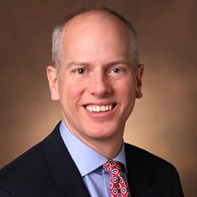Younger Ophthalmologists Twice as Likely to Receive Patient Complaints
Patients mostly concerned with diagnosis, recommendation, and medication issues, as well as doctor availability.
William Cooper MD MPH

William Cooper, MD, MPH
There’s not much about aging that’s worth getting excited about, but new evidence suggests that getting older carries a distinct benefit, at least for ophthalmologists — the older the eye physician, the less likely he or she is to receive patient complaints.
Researchers led by William O Cooper, MD, MPH of Vanderbilt University Medical Center in Nashville, Tennessee, set out to determine the distribution of unsolicited patient complaints (UPCs) by physician age, because a link could provide insight into common patient concerns and how to address them.
“Most previous studies of patient dissatisfaction have not addressed the factor of physician age and were unable to control for other characteristics (eg, practice setting, subspecialty) that may affect the risk for patient complaints, unsafe care, and lawsuits,” the authors wrote.
Cooper and colleagues stratified 1342 attending ophthalmologists or neuro-ophthalmologists who had graduated from medical school before 2010 into 5 age bands. Then, they followed up from the time of the participants’ employment to the receipt of their first complaint.
The oldest age band (>70 years) had the longest mean time to first complaint and the lowest complaint rate at 0.71 complaints per 1000 follow-up days. The remaining age group had complaint rates as follows:
- 61 to 70 years: 1.41 complaints per 1000 follow-up days
- 51 to 60 years: 1.84 complaints per 1000 follow-up days
- 41 to 50 years: 2.02 complaints per 1000 follow-up days
- 31 to 40 years: 1.88 complaints per 1000 follow-up days
While the 31 to 40-year group did not have the highest incidence of complaints, they did have the shortest time to first complaint, authors noted. In fact, the 2 youngest age bands were associated with a statistically significant shorter time to first complaint. Compared with those aged 71 years or older, the risk of incurring an unsolicited patient complaint (UPC) was 1.73-fold higher (hazard ratio 1.73, 95% CI, 1.21-2.46; P-0.002). Similarly, participants aged 31 to 40 years had a 2.36 times higher risk of incurring a UPC (HR 2.36; 95% CI, 1.64-3.40; P<0.001).
“Younger physicians may…have novice support staff and nurses, larger shares of ‘difficult’ patients referred by late- and mid-career ophthalmologists, and insufficient training and experience to handle unsolvable medical situations or emotionally difficult conversations,” researchers wrote.
The most common UPCs concerned care and treatment surrounding diagnosis, recommendations, and medications. These types of complaints ranged from 29% for ophthalmologists older than 70 years, to 44% among those aged 41 to 50 years.
The second most common complaints were concerns about accessibility and availability, ranging from 21% in the oldest group to 34% in age bands between 41 and 50, and 51 and 60 years.
According to the authors, communication concerns were commonly reported. These ranged from 20% in the 31 to 41-age band, to 31% and 33% in the 41 to 50 age band and 51 to 60 age band, respectively.
Concerns about perceived lack of humanistic concern for patient or family were proportionately fewer, ranging from 14% and 15% in the youngest and oldest age bands, to 26% and 27% in the 41- to 50-year and 51- to 60-year age bands.
All told, the proportion of ophthalmologists in each age band who received complaints specific to communication, care and treatment, humanistic concerns, access and availability, or billing did not differ significantly.
“Early-career physicians may be associated with less time to first complaint and overall more UPCs owing to the challenges of mastering new clinical systems and how best to provide excellent attending-level care largely on their own,” authors said. “Moreover, because younger physicians may be more up-to-date with best practices, their UPCs may derive less from cognitive or technical deficits than from behavioral and confidence issues.”